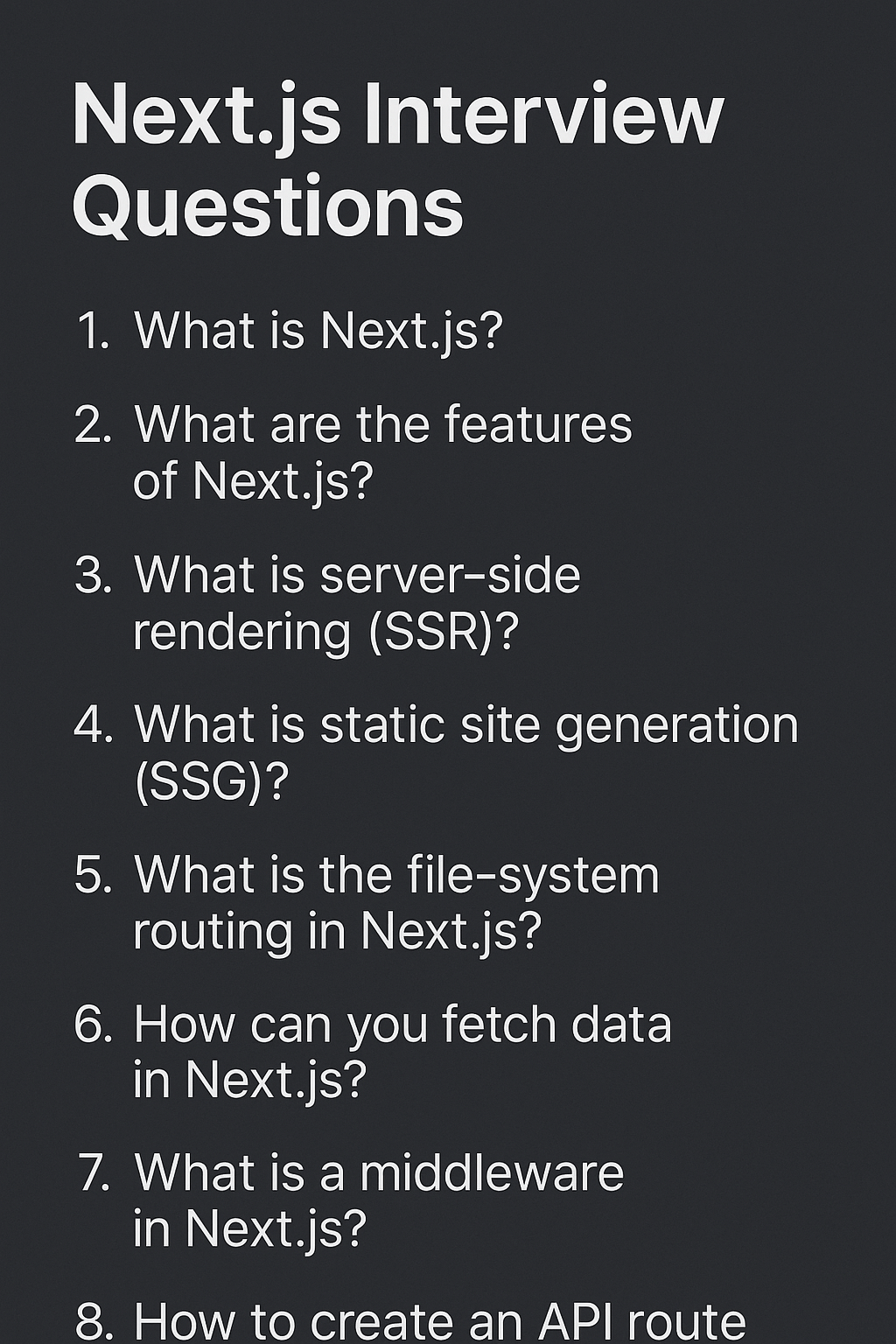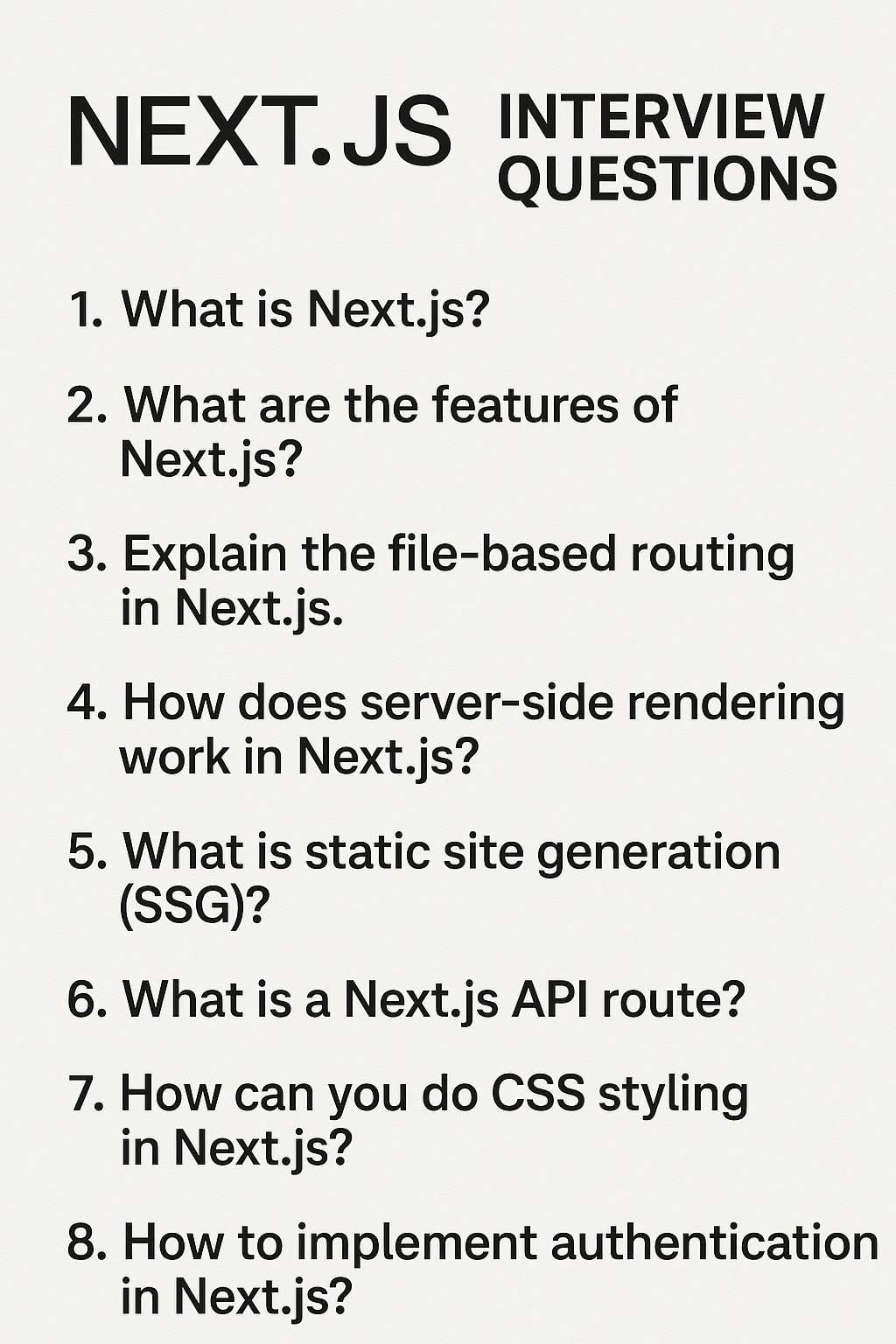Next.js is a powerful open-source JavaScript framework used to build fast, modern web applications with React. Developed by Vercel, it offers everything you need to build production-ready full-stack applications — including server-side rendering (SSR), static site generation (SSG), image optimization, API routes, and more — all out of the box.
In today’s digital world, users expect web pages to load instantly and perform flawlessly on any device. At the same time, developers need frameworks that simplify complex workflows. That’s where Next.js shines — it bridges the gap between performance and productivity, making it a top choice for React developers around the globe
Contents
Why Use Next.js?
Whether you’re building a blog, an e-commerce platform, or a dynamic dashboard, Next.js provides a scalable solution with excellent SEO support, performance benefits, and a developer-friendly experience. It eliminates the need to configure Webpack, Babel, or routing manually — everything just works.
Core Features of Next.js (Explained)
1. Server-Side Rendering (SSR)
Server-side rendering allows your React components to be rendered on the server and sent to the browser as fully-formed HTML. This results in faster first-load times and is excellent for SEO since search engines can crawl your content immediately.
Example Use Case:
A news site that needs to serve fresh content quickly and reliably to both users and search engines.
2. Static Site Generation (SSG)
Next.js can generate static HTML at build time for pages that don’t change often. This makes your app lightning-fast and reduces backend load.
Example Use Case:
Marketing pages, documentation sites, or blogs with infrequent updates.
3. Incremental Static Regeneration (ISR)
ISR is a unique feature that lets you update static content after deployment — without rebuilding the entire site. You choose which pages to regenerate and how often.
Example Use Case:
E-commerce product pages that update stock info every few minutes.
4. Automatic Code Splitting
Next.js automatically splits your JavaScript into smaller chunks. Only the code needed for the current page is loaded, improving performance and page load times significantly.
5. Routing System
Next.js uses a file-based routing system. Just drop a file into the pages folder, and it’s instantly available as a route. You can also create dynamic routes using brackets, like [slug].js.
6. API Routes
No need for a separate backend — you can build API endpoints right inside your Next.js project. Great for small apps, form handling, or integrating third-party services.
javascriptCopyEdit// pages/api/hello.js
export default function handler(req, res) {
res.status(200).json({ message: "Hello from Next.js!" });
}
7. Built-in CSS & Styling Support
Next.js supports:
- CSS Modules
- Sass
- Tailwind CSS
- styled-components
- PostCSS
This gives you complete flexibility in how you design your UI.
8. Hot Module Replacement (HMR)
With HMR, changes you make in development instantly show in the browser — no full reloads needed. This dramatically speeds up development.
9. TypeScript Support
Next.js comes with built-in TypeScript support. Just add a tsconfig.json file, and you’re ready to go. It helps catch bugs earlier and improves scalability for large codebases.
10. Image Optimization
The next/image component helps deliver fast, responsive images with lazy loading and automatic resizing. Optimized images = faster websites.
Getting Started with Next.js
To start a new Next.js app:
bashCopyEditnpx create-next-app@latest my-app
cd my-app
npm run dev
You’ll get a starter project with everything configured — including routing, HMR, and TypeScript (if you choose it).
Deployment Options
You can host your Next.js app on:
- Vercel – seamless integration
- Netlify
- AWS
- DigitalOcean
- Your own server (Node.js)
Next.js gives you the best of both worlds: the power of React with the structure and features of a production-ready framework. Whether you want to build a lightning-fast blog or a scalable SaaS product, Next.js is a smart choice.
If you’re serious about building modern, SEO-friendly web applications, give Next.js a try today.
Real-World Applications of Next.js
Next.js is trusted by startups and global brands alike. Here’s how it’s used:
- E-commerce: Platforms like Shopify and BigCommerce use Next.js to power blazing-fast product pages with dynamic content and server-side rendering.
- SaaS Dashboards: Tools like Linear and Vercel use it for internal admin dashboards and customer portals, benefiting from ISR and API routes.
- Content Platforms: Marketing websites, developer blogs, and landing pages take advantage of SSG for fast load times and easy updates.
- News & Media: Publishers use SSR to serve fresh content and improve SEO performance for breaking news and headlines.
2. Benefits for Developers (+100 words)
Explain why developers love using Next.js and how it boosts productivity.
Example:
Why Developers Love Next.js
Next.js dramatically simplifies the developer experience. It eliminates configuration headaches and lets you focus on writing features, not fighting your tooling. Features like HMR, file-based routing, and built-in API routes mean faster iteration, fewer bugs, and a smoother launch process. With support for TypeScript, ESLint, and testing tools like Jest or Cypress, it’s ready for serious development out of the box.
3. Comparison With Other Frameworks (+150 words)
Compare Next.js with Gatsby, CRA, and traditional SSR. Use a chart or paragraph format.
Example:
Next.js vs Other Frameworks
| Feature | Next.js | Gatsby | Create React App |
|---|---|---|---|
| Server-side rendering | ✅ Built-in | ❌ No | ❌ No |
| Static generation | ✅ Built-in | ✅ Yes | ❌ No |
| API routes | ✅ Built-in | ❌ Plugin | ❌ Separate backend needed |
| Routing | ✅ File-based | ✅ File-based | ❌ Manual |
| Image optimization | ✅ Automatic | ⚠️ Plugin-based | ❌ No |
While Gatsby is great for static content and CRA works for small SPAs, Next.js covers more use cases — dynamic, static, and hybrid.
4. SEO Benefits of Next.js (+100–150 words)
SEO is a huge selling point. Explain how SSR, metadata, clean URLs, and faster speeds help rank better.
Example:
Next.js and SEO
Next.js helps your pages rank higher in search engines by serving pre-rendered HTML, which search engines can crawl easily. It supports:
- Custom meta tags via the
next/headcomponent - Readable URLs through file-based routing
- Faster page loads, which reduce bounce rates
- Open Graph / Twitter Card integration for better social sharing
These features combined make it a go-to choice for marketing teams and content-driven websites that rely on organic traffic.
5. Advanced Features to Explore Later (+100 words)
Briefly introduce advanced concepts that could interest intermediate users.
Example:
Advanced Next.js Features Worth Exploring
Once you’re comfortable with the basics, Next.js offers powerful features like:
- Middleware: Control routing, redirects, and authentication at the edge.
- Edge Functions: Run serverless code close to the user for faster response times.
- App Router (v13+): A new routing paradigm with nested layouts and streaming support.
- Internationalization (i18n): Easily build multilingual websites.
These features let you scale your app globally, handle complex workflows, and improve performance across the board.
Next.js vs Other Frameworks
| Feature | Next.js | Gatsby | Create React App |
|---|---|---|---|
| Server-side rendering | ✅ Built-in | ❌ No | ❌ No |
| Static generation | ✅ Built-in | ✅ Yes | ❌ No |
| API routes | ✅ Built-in | ❌ Plugin | ❌ Separate backend needed |
| Routing | ✅ File-based | ✅ File-based | ❌ Manual |
| Image optimization | ✅ Automatic | ⚠️ Plugin-based | ❌ No |
While Gatsby is great for static content and CRA works for small SPAs, Next.js covers more use cases — dynamic, static, and hybrid.
4. SEO Benefits of Next.js (+100–150 words)
SEO is a huge selling point. Explain how SSR, metadata, clean URLs, and faster speeds help rank better.
Example:
Next.js and SEO
Next.js helps your pages rank higher in search engines by serving pre-rendered HTML, which search engines can crawl easily. It supports:
- Custom meta tags via the
next/headcomponent - Readable URLs through file-based routing
- Faster page loads, which reduce bounce rates
- Open Graph / Twitter Card integration for better social sharing
These features combined make it a go-to choice for marketing teams and content-driven websites that rely on organic traffic.
5. Advanced Features to Explore Later (+100 words)
Briefly introduce advanced concepts that could interest intermediate users.
Example:
Advanced Next.js Features Worth Exploring
Once you’re comfortable with the basics, Next.js offers powerful features like:
- Middleware: Control routing, redirects, and authentication at the edge.
- Edge Functions: Run serverless code close to the user for faster response times.
- App Router (v13+): A new routing paradigm with nested layouts and streaming support.
- Internationalization (i18n): Easily build multilingual websites.
These features let you scale your app globally, handle complex workflows, and improve performance across the board.




